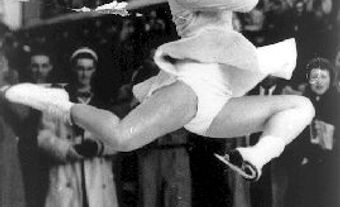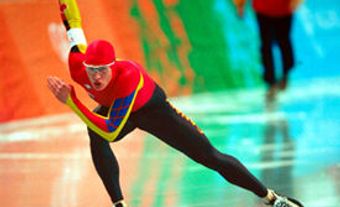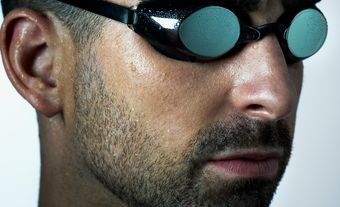This article was originally published in Maclean's Magazine on March 2, 1998

Olympic Hockey Meltdown
The 1998 Olympic gold-medal hockey game had plenty in common with all those gold-medal games of the 1960s and '70s, except this time the Russians and the Czechs wore Nike. After all the hype and great expectations, a team of hustling but lead-handed Canadians was reduced to the supporting cast in what may qualify as the greatest hockey tournament ever staged. European teams swept the medals. Canada played gamely but unsuccessfully for bronze. Just like the bad old days when they sent the amateurs.Instead, the glory went to players like Pavel Bure, the Russian rocketeer with a sweet scoring touch, and Dominik Hasek, the Czech goaltender built like a slab of the old Berlin Wall - with Cold War-era impenetrability. The ultimate Czech victory was the reality check for all those fans who somehow imagined Olympic hockey was going to be a North American demonstration sport, pitting Canada against the United States. There were, as cautious Canadian players had warned the unconvinced all along, many dream teams in Nagano.
But prescience does not take away the sting. "The loss is devastating, the worst feeling in the world," Wayne Gretzky said in a near-whisper after dropping the semifinal, 2-1, to the Czech Republic in a dramatic, ratchet-up-the-tension Olympic twist called the shootout. The Canadians were so crushed that they failed to regroup for the next day's bronze-medal game against Finland. The Finns won 3-2 in a game played in a funereal atmosphere at Nagano's Big Hat arena, where the normally boisterous crowd seemed to sense that polite, sympathetic clapping was more suitable for a consolation game. "Sure it would have been nice to go home with a medal," said Theo Fleury, leaving the Canadian dressing room for the last time, a day earlier than expected. "But we came here to win."
That is the conundrum now facing Canadian hockey: in a sport where international parity exists among half-a-dozen (if not more) elite teams, Canadian players and fans remain conditioned to expect only gold from those who wear the Maple Leaf. Canada's women's team tasted similar pressure when it fell 3-1 to the Americans in the final of the first-ever Olympic women's hockey tournament. Even the players seemed to regard the silver medals around their necks as symbols of failure. "We have a silver medal, but the fact is we lost the game," said Cassie Campbell, part of a Canadian team that dissolved into inconsolable sobs after losing. "It doesn't feel like we won anything." Only the next day did Campbell recover slightly, getting a new perspective from two-time silver medallist speed-skater Susan Auch, who stopped her in the athlete's village to tell her: "You know, Cassie, a silver medal is a great thing."
It may yet take some time before Canada's best get accustomed to playing for a place in the medals. But the excitement and drama of the men's tournament suggests that the Winter Olympics and the world's top players may now be embarking on a beautiful friendship. The games on Nagano's big ice were marvellous entertainment. Skills flourished, free from the threat of thuggery without any shortage of the jarring body-thwacking that the NHL offers. "I don't think you're going to find a guy who didn't like it," said a gracious Joe Nieuwendyk. "It's been one of the greatest hockey experiences of my career. And a gold medal might have rated even higher than a Stanley Cup."
Nieuwendyk spoke with his hair still wet from the postgame shower, and the Olympic glow may very well fade once the annual spring chase for the Stanley Cup begins. But NHL executives seemed upbeat about their Olympic moment, too. The league will decide next year whether to free its best players from mid-season duty to play in the 2002 Salt Lake City Games, a likely scenario given that those Olympics will be more conducive to American prime time than Japan's other-side-of-the-globe time difference allowed.
There were still a few forced smiles among NHL brass last week over the American team's clunker of a performance, however. The U.S. men never gelled, never seemed to concentrate on hockey. "I can't look in a guy's eyes and tell if he's more focused than me," sneered Brett Hull when asked if the Canadians were better-prepared, showing more snap in his quotes than in his shot. The irritable Americans complained about the bigger ice, the officiating, and how the hockey gods had fingered them alone to face hot goalies. "We got a raw deal," said forward Doug Weight after losing to Canada, 4-1, in the round-robin part of the tournament and insisting that Canada's second goal should have been disallowed for having a man in the crease.
Coach Ron Wilson tried to motivate his players by showing clips from the frat movie Animal House before the quarter-final against the Czechs. His team went out with a whimper. The Animal House lessons came in handy later at the Olympic Village, though, when a few players snapped some of the wooden Japanese furniture in their rooms and covered the walls with fire-repellent foam. "I know it doesn't look good on paper," said Wilson after his team was chased by the Czechs. It did not look good on or off the ice.
The Canadians, by contrast, could at least take home a consolation ribbon for good behavior. They revelled in mixing with other athletes in the village, removing any skepticism that hockey millionaires could get into the Olympic spirit. "I think our team has handled everything with class," said forward Rob Zamuner. "Every one of us represented our country very well."
The Canadians can also claim North American bragging rights after their convincing win over the Americans in a much-anticipated rematch of the 1996 World Cup final. Hasek's fine play in beating the United States kept the Canadians and Americans from meeting again. "We're going to fire a lot of rubber and go to the net," said captain Eric Lindros when asked how his team would solve Hasek. But Steve Yzerman was more circumspect. "Everybody's tried pretty much everything with Hasek," he said with a shrug. "You just go in and shoot where he isn't."
Once the game began, it took 58 minutes and 57 seconds before Trevor Linden finally ricocheted a shot at the Czech goal where Hasek wasn't, tying the score at 1. Ten minutes of overtime resolved nothing, bringing on the shootout: five players from each team in an Olympic version of a street hockey showdown. After Robert Reichel scored on the Czech's first shot, Hasek stoned five consecutive Canadian shooters (none of them Gretzky, providing fodder for years of barstool arguments). "It's obviously very exciting, but I didn't care much for it before and I care for it less now," said Yzerman of the shootout. The Czechs, meanwhile, will probably put one of Hasek's saves on a national stamp.
The Canadian women's loss was just as heartbreaking. In the most important women's hockey game to date, a team that had won all four world championships came up flat. Their freewheeling third period was not enough to overcome a swifter - on this night - American squad. And just as men's team general manager Bobby Clarke had taken heat for his selection of players, women's coach Shannon Miller endured sniping for the handling of hers. Most attacks focused on the way she prepared her team for the Olympics, suggesting players were too high-strung and tight under her guidance.
Opponents like U.S. captain Cammi Granato certainly thought the Canadians were tense. "They had all the pressure of holding off a team that has finally caught up to them in talent," said Granato. American coach Ben Smith handles his team in a fatherly manner, says Granato. He tells parables before a game. Canada's Miller, on the other hand, likes to keep her team in "the bubble," isolated from distractions like family, then "motivate the hell out of them" at the last minute, she says. The last minute for the Canadians came before a desperate third period when the team - down by a goal - watched video clips of their finest moments to the tune of Simply the Best. The move provoked sneers from critics. "It worked," retorted Miller, whose team went on to play their best period of hockey. "Yeah," said assistant coach Daniele Sauvageau wryly. "Maybe we should have played the video earlier."
Miller's players defended her to the hilt, suggesting that male hockey writers just don't like the women's game. But in the aftermath, the Canadians looked like crash survivors. Tears flowed freely hours after the game at a reception for players and their families. They talked of the importance of the Olympic journey, but it was still too soon to forget the dashed expectations.
"You'll wake up tomorrow and feel dead, completely drained," Clarke told a group of the women, as they all sucked on cigars. "But in two or three days, you'll come back." Perhaps when the players and the nation come out of their funk, they will take a little pride in the way the world has embraced Canada's game.
Maclean's March 2, 1998

 Share on Facebook
Share on Facebook Share on X
Share on X Share by Email
Share by Email Share on Google Classroom
Share on Google Classroom


